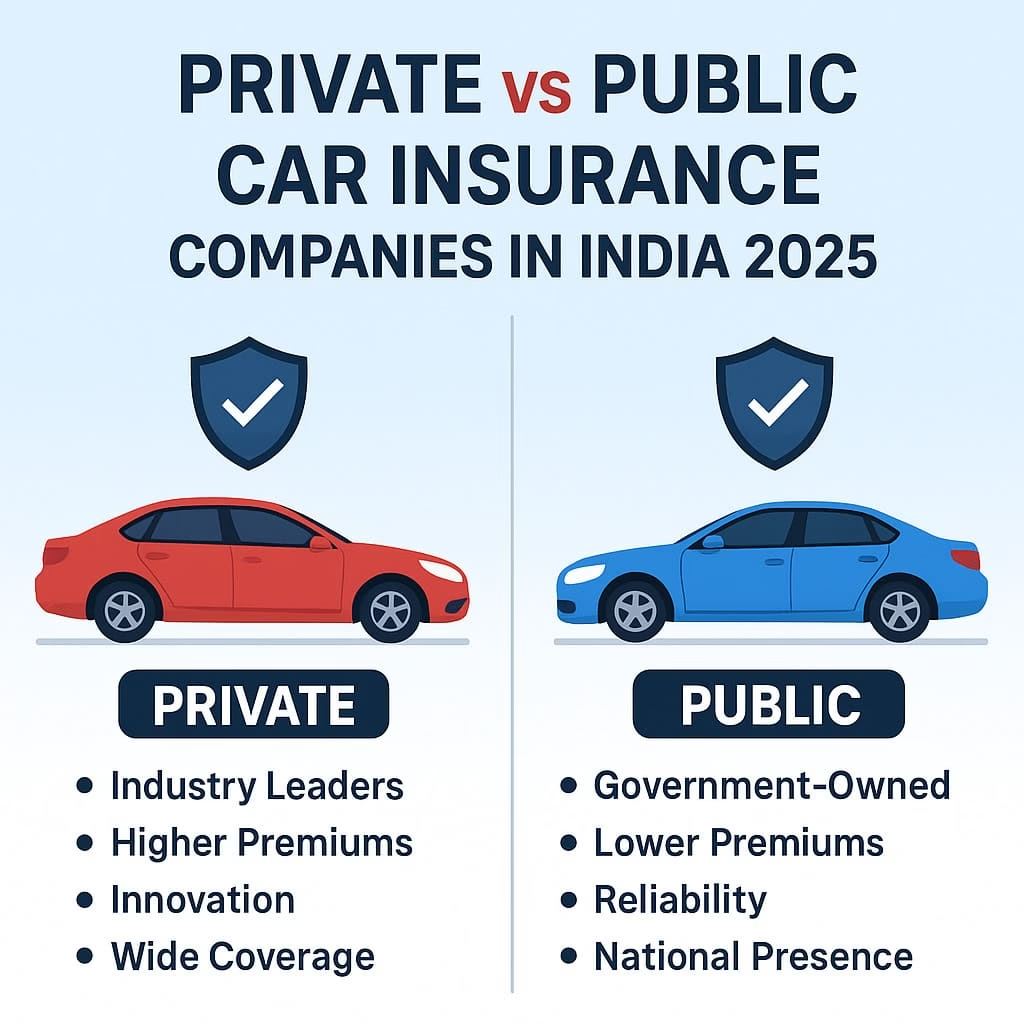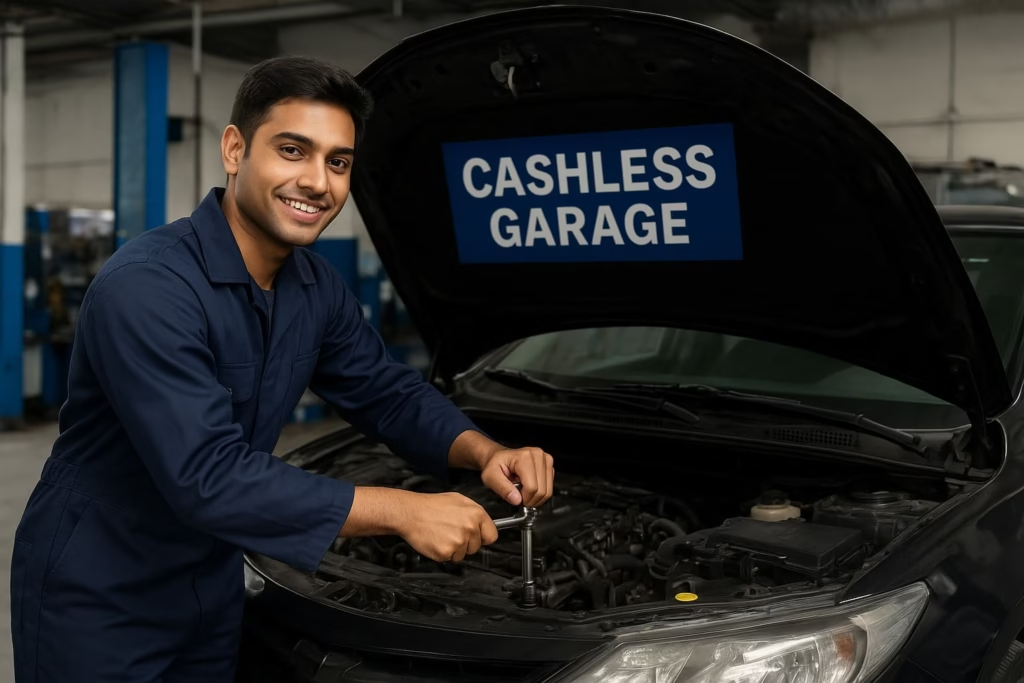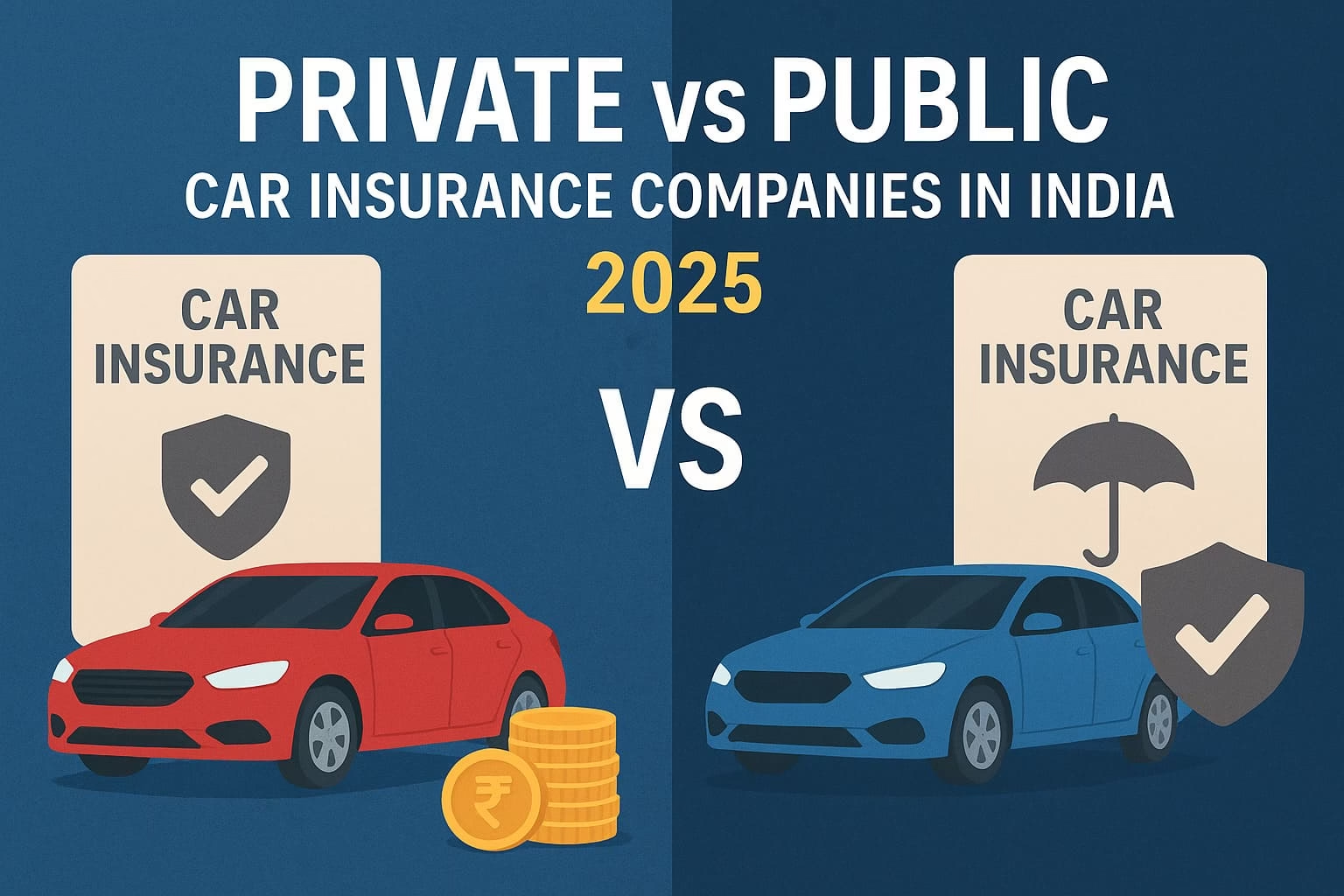Introduction
When it comes to protecting your car and your finances, choosing the right insurer is just as important as choosing the right policy. For millions of drivers, the decision boils down to one critical debate: Private vs Public Car Insurance Companies in India.
In 2025, this choice has become even more significant. Digital-first private insurers offer app-based claims and customized add-ons. government-backed public insurers providing stability and lower premiums. The difference between private and public car insurance in India is more pronounced than ever.
So, which one should you trust? This guide takes a deep dive into the advantages, disadvantages, claim processes, premium comparisons, and customer experiences of both sectors—helping you make an informed choice before you renew or buy a car insurance policy in 2025.
What Are Public and Private Car Insurance Companies?
Public Car Insurance Companies (Government-Owned)
Public insurers are companies where the Government of India holds a majority stake. Examples include:
- New India Assurance
- United India Insurance
- National Insurance Company
- Oriental Insurance Company
These insurers are decades old and considered stable, with strong rural penetration and consistent claim settlement ratios.
Private Car Insurance Companies (Privately Managed)
Private insurers are corporate-owned, often in partnership with global insurance giants. Examples include:
- HDFC ERGO General Insurance
- ICICI Lombard
- Bajaj Allianz
- Reliance General Insurance
- Tata AIG General Insurance
They compete on customer service, technology adoption, and innovative products.
Both private and public car insurers are regulated by the IRDAI, ensuring fair practices and financial safety for customers
Key Differences Between Private vs Public Car Insurance Companies in India

| Aspect | Public Car Insurers (Government) | Private Car Insurers (Private Sector) |
|---|---|---|
| Ownership | Majority-owned by Government of India | Owned by private corporations |
| Premium Pricing | Lower, standardized | Competitive, customized to driver profile |
| Claim Settlement Ratio (CSR) | Historically high, stable | High but varies between insurers |
| Claim Process | Slower, paperwork-driven | Fast, digital, app-based |
| Add-On Covers | Limited options | Wide variety (Zero Dep, Engine Cover, RTI, Telematics) |
| Technology | Slow adoption | AI-powered, telematics, instant online quotes |
| Garage Network | Wide, especially in rural areas | Strong in urban/metropolitan areas |
| Customer Service | Traditional, branch-based | 24/7 helplines, chatbots, WhatsApp claims |
| Best For | Budget-sensitive, rural customers | Urban drivers, EV owners, tech-savvy users |
Advantages of Public Car Insurance in India
- Government Trust & Stability – Backed by the Government of India, public insurers carry a strong reputation for financial security.
- Lower Premiums – Their pricing is often standardized, making them budget-friendly for cost-conscious customers.
- High Claim Settlement Ratios – According to IRDAI reports, public insurers maintain steady claim settlement performance.
- Rural Reach – With offices and tie-ups across semi-urban and rural India, they are accessible to customers outside metro cities.
Public insurers like National Insurance continue to dominate in rural and semi-urban areas with their affordable plans.
Advantages of Private Car Insurance Companies in India

- Digital-First Approach – Private insurers excel at offering instant policy issuance, online renewals, and mobile-based claims.
- Customizable Policies – They offer a wide range of add-ons like Zero Depreciation Cover, Engine Protection, and Roadside Assistance.
- Fast Claim Processing – With AI-driven claims and WhatsApp assistance, claim settlement is much quicker compared to traditional public insurers.
- Urban Focus – Strong garage tie-ups in metros ensure faster repairs.
👉 For an in-depth look at specific private companies, check our comparison: HDFC ERGO vs ICICI Lombard: Best Car Insurance Comparison in India (2025 Edition).
Case Study: How Premiums Differ Between Public vs Private Insurers (2025)
Let’s compare how premiums differ for a Maruti Swift (Petrol, 2022 model, Delhi):
| Insurer Type | Third-Party Only Premium (₹) | Comprehensive Premium (₹) |
|---|---|---|
| Public Insurer (United India) | 2,094 | 8,850 |
| Private Insurer (HDFC ERGO) | 2,150 | 9,750 (with add-ons worth ₹3,000) |
👉 Insight: Public insurers are cheaper for basic coverage, while private insurers add value with flexibility and add-ons.
Private vs Public Car Insurance Companies in India: Customer Experience in 2025

- Public Insurers: Customers appreciate lower premiums, but many still complain about slow claims and paperwork.
- Private Insurers: Customers prefer ease of apps, WhatsApp updates, and digital claims, even if premiums are slightly higher.
Latest Trends in Private vs Public Car Insurance in India

- Usage-Based Insurance (UBI): Private insurers are introducing pay-as-you-drive plans based on telematics.
- EV Insurance: Private insurers lead in EV coverage with battery protection add-ons.
- Digital Claims: Public insurers slowly adopting online claim portals, but private players are ahead.
- Hybrid Coverage: Some insurers offering wellness packages + car insurance for bundled benefits.
Expert Recommendation
- Choose Public Insurers if:
- You live in rural/semi-urban areas.
- You want lower premiums and government-backed stability.
- You don’t mind paperwork or slower claim settlement.
- Choose Private Insurers if:
- You drive in cities and need quick claim settlement.
- You want advanced add-ons like RTI or Zero Depreciation.
- You own an EV or premium car requiring specialized coverage.
If you’re still unsure, explore our Ultimate Guide to Car Insurance in India to get a broader understanding of policies.
FAQs on Private vs Public Car Insurance Companies in India
Q1: Which is better in 2025—Private vs Public Car Insurance Companies in India?
Both are IRDAI-regulated, but public insurers carry government backing while private insurers excel at customer service.
Q2: Do private insurers always charge higher premiums?
Not necessarily. For safe drivers with telematics, private insurers can offer lower premiums.
Q3: Which insurers have better claim settlement?
Public insurers traditionally have high claim settlement ratios, but top private insurers now match them with faster digital processes.
Q4: Can I switch from public to private car insurance in India without losing NCB?
Yes, you can switch during renewal without losing benefits like the No Claim Bonus (NCB).
Q5: Which is better for electric vehicles (EVs)?
Private insurers are leading in EV coverage, offering battery and charging station protection.
Q6:Are add-ons different in private vs public car insurance companies in India?
They do, but the options are limited compared to private insurers.
Q7: What happens if a public insurer goes bankrupt?
Since they’re government-backed, policyholders are protected—a reason many trust public companies.
Conclusion
In the private vs public car insurance companies in India debate, there’s no one-size-fits-all answer.
- Public insurers win on affordability, trust, and rural reach.
- Private insurers lead on technology, faster service, and add-on customization.
🚗 If you’re budget-conscious, go public.
🚀 If you value digital convenience and flexibility, go private.
When choosing between private vs public car insurance companies in India, always compare quotes before buying.
